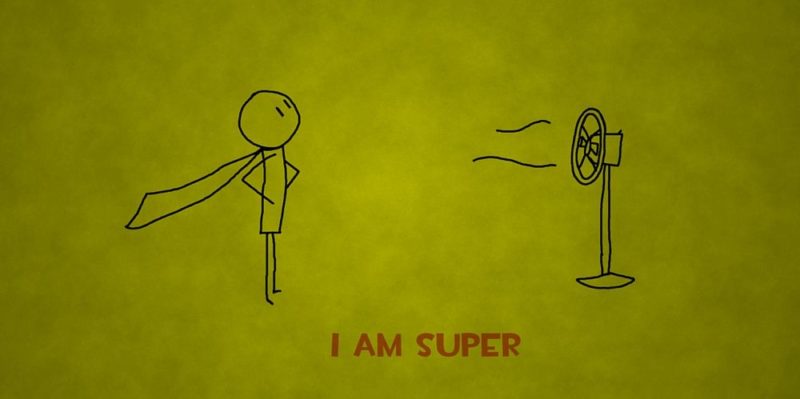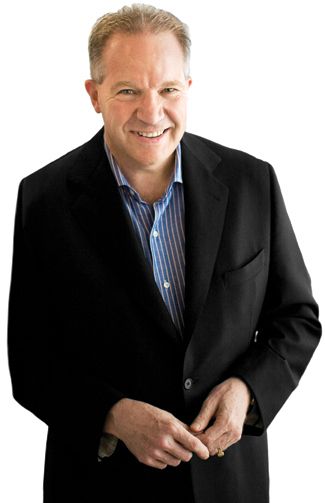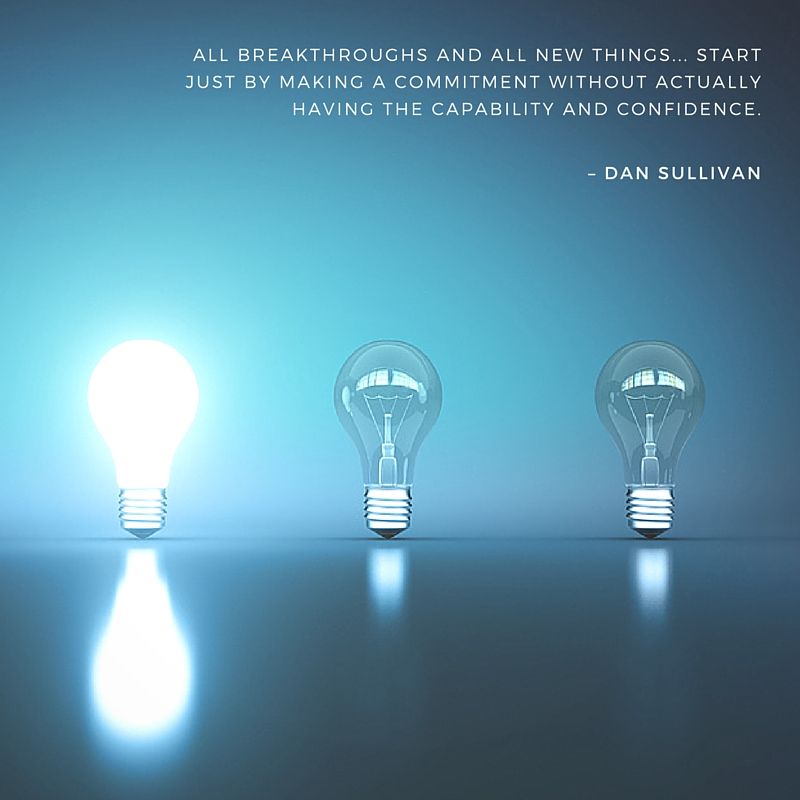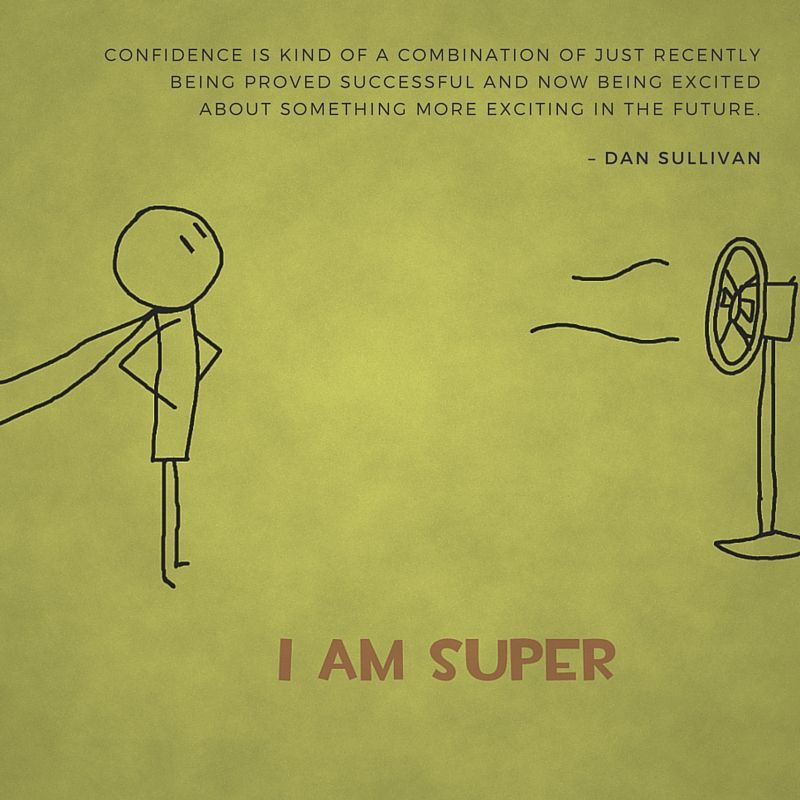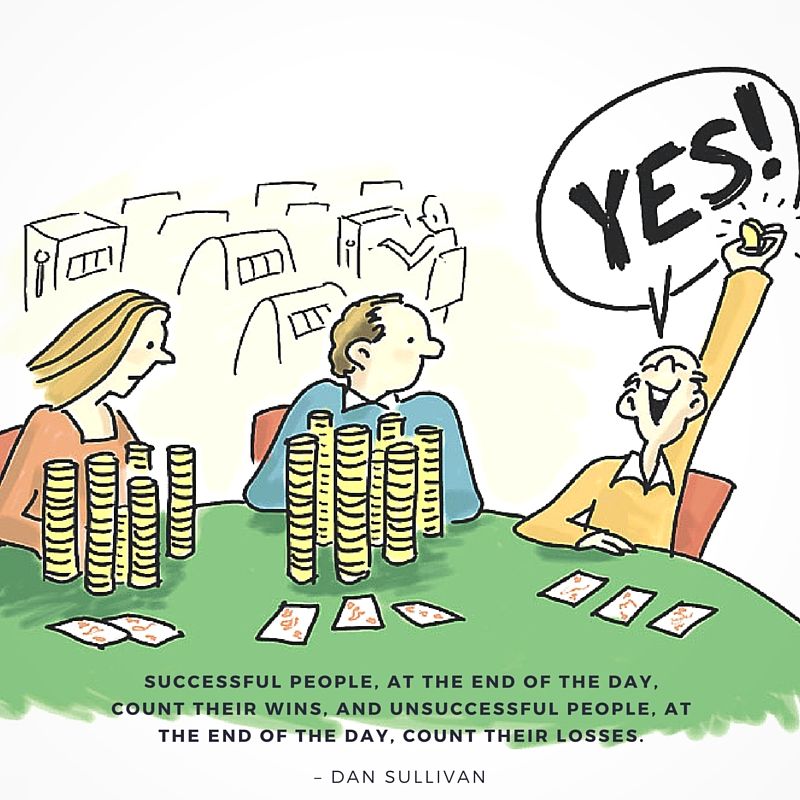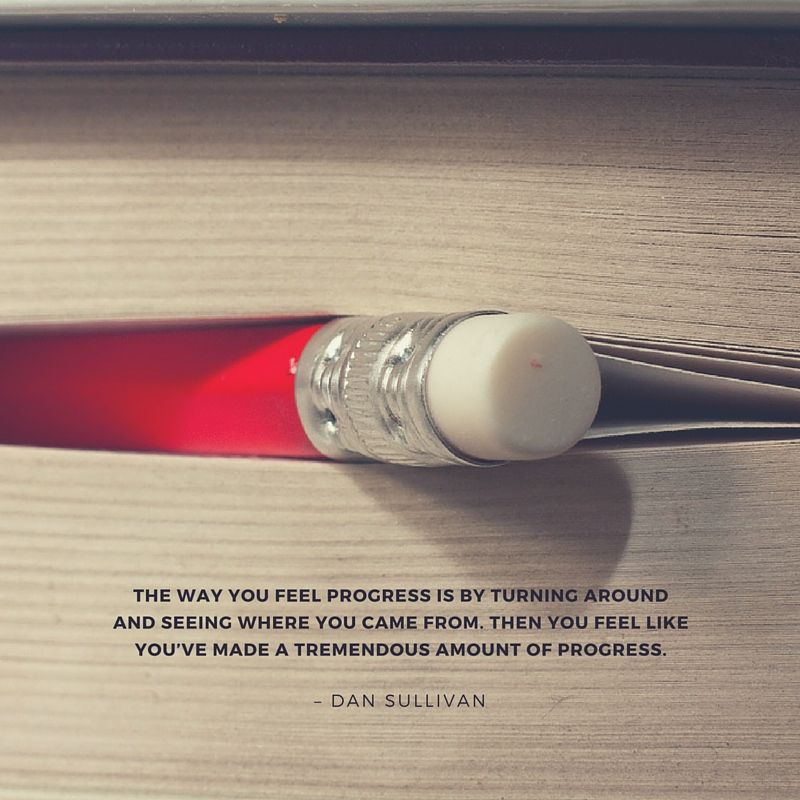[smart_track_player url=”https://soundcloud.com/smartermarketerproject/how-to-become-your-best-asset-a-simple-guide-dan-sullivan-interview” title=”How to Become Your Best Asset: A Simple Guide (Dan Sullivan Interview)” artist=”Yuri Elkaim” social=”true” social_twitter=”true” social_facebook=”true” social_gplus=”true” ]
You can learn about Dan Sullivan’s masterful ways by grabbing a free copy of his “The Four C’s” book here.
In this article
*******
Dan Sullivan has helped me make made profound changes in my overall thinking, as well as my business.
What’s beautiful is that the concepts he’s going to discuss go far beyond just business.
What you’re about to learn will affect every other area of your life in a very positive manner. If you know anyone who could benefit from the concepts we’re about to go over, please share this post with them.
I’ve worked with Dan for a number of years, and I knew of him and read his work and listened to his audios for several years before that.
I have to say, he and his wife Babs are two of the most gracious people I know and are incredible human beings.
Dan is, in my mind, one of the leading – if not the leading – coach for high-level entrepreneurs in the world. He’s personally worked with more than 6,000 elite – I’m talking top-level – entrepreneurs over the past 35 years.
A visionary and innovator, and a gifted, conceptual thinker, Dan has more than 35 years worth of experience as a speaker, consultant, strategic planner, and coach.
He is the founder and president of The Strategic Coach Inc., which he owns and operates with Babs, with offices in Toronto. Chicago, and the U.K., with new workshops being held in Los Angeles and Vancouver.
Dan’s strong belief and commitment to the power of the entrepreneur is evidenced in all areas of Strategic Coach. He is the author of more than 30 publications, including The Great Crossover, The 21st-Century Agent, Creative Destruction, and How the Best Get Better. He is the coauthor of The Laws of Lifetime Growth and The Advisor Century.
Dan is one of those big-time thinkers: He’s going to give you perspectives, concepts, and frameworks that you probably never even thought of in the first place.
In this interview, we’re going to talk about some really cool concepts, like the Four Cs, the Gap, and the importance of confidence as an entrepreneur – but really, for anyone in general.
Mastering the Four Cs
Yuri: I’m really excited to have you on board here, Dan. You’ve been someone I’ve looked up to for a number of years, even before being a part of Strategic Coach.
I have to say that program has been a big eye opener for me personally.
A lot of small and big revolutions and evolutions have come out of being part of the program for me. I want to thank you for all the awesome concepts, insights, and brain tweaks that you’ve helped me develop over the years.
I want to highlight some of your concepts and insights because a lot of entrepreneurs, as you know, focus so much on day-to-day tasks. They don’t really sit back and think about some of the bigger frameworks of thinking.
You’re a big proponent of thinking about your thinking, which is something most people don’t even consider.
You have an amazing framework called the Four Cs. Can you walk our audience through the four Cs, what it’s all about, and how they can live it on a day-to-day basis?”
Dan: First of all, to give everybody a framework, the Four Cs are, in this order: commitment, courage, capability, and confidence.
What I’ve observed is the inability of certain entrepreneurs to take action in their lives. It occurred to me as I studied this that there was a problem in their minds, and they wouldn’t start a new initiative until they felt confident about it.
In other words, they made it a requirement that they feel confident about the project they were undertaking before they would actually take action.
The other thing that goes along with that, if I question them about their confidence, they’d say, “Actually, what I really want is the capability to achieve what I’m setting out to do.”
What it was like is that they were making a demand that they wanted to take on something new they’d never done before, but they want to be guaranteed up front that they’re going to have the capability and confidence to do that.
As an entrepreneur myself and after observing thousands of other really successful entrepreneurs over the past 40 years, I said, “You’re kind of getting it backward.”
It All Starts by Making a Commitment
Really, all breakthroughs and all new things that entrepreneurs create in their lives start just by making a commitment without actually having the capability and confidence.
As a matter of fact, you’re actually striving for the breakthrough so that you acquire the capability. It’s actually the result of taking action.
First, you commit yourself to a particular result. The best way to do that is to put a deadline on it and put a measurement on it. Then you’re immediately thrown into a situation that I call courage, and that is that you’ve committed.
The best commitments are ones where you have witnesses, where other people know that you’ve actually committed.
And then you’re thrown into a situation where you’re caught between your commitment and the fact that you don’t yet have the capability and confidence, so there’s this scary part.
In that scary zone, where your creativity really comes into play, you actually create the new capability and the confidence that will represent a breakthrough in your life.
You take a jump, but I’ve never seen anybody get a brand-new capability and brand-new confidence unless they’ve been willing to actually commit to a situation where they’re not guaranteed the result up front, and that takes a lot of courage.
Courage is really the key.
Have Courage and Go Forth
Yuri: What’s beautiful about this framework is when people understand, and can say: “I can see how this applies to so many different areas of my life!”
Especially from an entrepreneurial side of things, I always find it fascinating to look at the world of venture capital and Silicon Valley startups versus actual entrepreneurs who are bootstrapping their business.
Not to say that venture capital-backed companies don’t have the courage, but I find that entrepreneurs who don’t have $10 million backing them are forced into – and maybe you’ve seen this yourself, maybe to a greater degree – courage even to a greater degree, where they take the attitude, “I have to figure out a way to make this work; otherwise, I can’t feed myself.” It’s a beautiful thing.
Dan: There are seven billion people on the planet. If we have a billion of them doing this type of thinking on a daily basis, a lot of good things would happen.
The thing about it is that we’ve found that children as young as six years old can grasp this concept in about 15 minutes with their parents’ help. Once you give a child the ability to know that anything they wanted in their life is going to require commitment and courage on their part and if they’re willing to go through that, then they’ll create new capability and confidence.
My sense is that you’ve given them the greatest power that you can give a child, because then they’ll uniquely develop according to what they’re interested in and what they’re really talented in and what their circumstances are. You don’t have to worry about how they’re going to develop. If they’re capable of commitment and courage, then everything else will be good.
Yuri: Let me ask you: A lot of our readers are health coaches and topic experts in different industries. They are coaches, advisors, and experts working with everyday people who, for instance, want to lose weight and are always on to the next diet or exercise program.
How do you encourage people from a coaching perspective to instill this idea of courage in those who have repeatedly failed time and time again to achieve a goal and maybe they’re just looking for the quick fix now?
Dan: There are actually two courages involved with someone who’s had previous failure. They have the normal courage that goes with getting a new result, but they have another courage that’s required, and that is to commit themselves in spite of their previous failure.
There’s actually a double-edge courage. That’s why it’s really tough for people who have tried and tried and tried and failed, because they’re not just starting at ground-level zero; they’re starting from out of a hole.
But the whole point is that there’s no other way forward. That’s important for people to realize.
Courage, if you have it, solves an enormous number of problems, and you don’t need a lot of other knowledge, you don’t need a lot of other skill because other people’s knowledge and skills will be attracted to your courage; other people’s support will be attracted to your courage.
As humans, we love examples of courage around us, and wherever we see it, we’ll throw ourselves into supporting that other individual.
Making Your Goals Public Gives Them Power
One of the reasons why people fail, I think, in the type of situation you’re talking about is that they do so without any one else knowing they’re involved in some sort of commitment.
They fail alone and they fail silently.
Personally, if I’m going to fail, I’m going to make a public spectacle out of it.
First of all, it’s about not looking like a fool, which is part of the motivation. That’s part of the scare: that I’m going to look like an idiot.
You know me from the workshop, Yuri, and that I’m always stating I’m going to achieve some goal by a specific date, and I state it in front of at least 600 people every quarter.
I’ve learned that it’s very important for me to make these things known because part of what motivates me is being seen as someone who can pull this sort of thing off.
I guess that would involve part of my capability and confidence that I can take on new, even scarier things than I’ve done before, and continue to build those feelings.
If you’ve dug yourself into a hole, the first commitment and the first courage are both going to require you to just get yourself out of the hole. Then you can start building.
Ultimately, you’re the only one who can pull this off. Part of the courage is to just accept the absolute, 100 percent responsibility for that.
Yuri: Yes, it’s an important mindset for sure. You have a great quote – I’m just going to paraphrase this because I don’t know if it’s exactly the same – you say something to the effect of: Fear is peeing your pants; courage is what you do with wet pants.
I think that’s such a great way of illustrating this whole concept really seamlessly.
For somebody listening to this who’s like, “Okay, I understand I have to commit and I have to have the courage to literally build the bridge as I’m crossing this chasm,” how do you distinguish between capability and confidence?
Once they’ve kind of gone through the courage and are on the flip side of capability, how does somebody know they’re in capability versus confidence? Do they work side-by-side?
Capability Comes from Having the Courage to Try
Dan: From my standpoint, to put it in the simplest possible term, capability is being able to make an impact in the way that you want to make an impact on the world outside of yourself.
In the coaching business – you and I are both in the coaching business –there are certain ideas we’d like to get across successfully. One of the ways we know it’s successful is because the people who are paying us are getting the results we told them that they would get if they would follow our direction.
That’s a capability.
The confidence part is the emotional and psychological reward you get from knowing that’s true. Confidence is your own psychological and emotional reward knowing that you actually did make that impact and, because of that, you can make an even bigger impact in the future.
Confidence is kind of a combination of just recently being proved successful and now being excited about something more exciting in the future.
It’s kind of a dynamic feeling, and we can spot it in other people, that they have this confidence. We bet on people who are confident. But before we bet on them, we check out to see what kind of capability actually created their confidence.
Yuri: That’s a great explanation.
You guys have a great tool called WinStreak, which is an app you can download if you’re listening on your iPhone or smartphone, which is almost like a success or gratitude journal, where you record three of your successes during the day at the end of the day. It’s a great way to reinforce those successes to build your confidence over time.
Count Your Wins Every Day
Dan: One of the things that I look for whenever I meet someone is: At the end of the day, do they build themselves up, or do they tear themselves down?
What I mean by that is you get to bedtime and you turn around – and we all do this – and review the day. Do we interpret the day as positive and in our favor, or do we interpret the day as negative? We actually move backward during the day or we fell down during the day.
It’s not actually based on the facts of the day; it’s based on my interpretation of the day. For example, I can have had a very challenging day when things didn’t work for me, so when I get to the end of the day, I don’t use as my evidence the actual successes that I had during the day; I use as my basis how I handled the fact that I wasn’t being successful.
I call these wins and the app you’re talking about is WinStreak, and it’s a free app that people can get.
When you’re reviewing at the end of the day, just before you go to bed and you’re getting ready for tomorrow, you simply check back and identify three things since the time you got up in the morning that were wins.
They moved you forward; they made you better; they made you stronger, and, as a result of these three wins, tomorrow is going to be better. If you just got in the habit of doing that every night, your brain would automatically start designing tomorrow so that you could have three more wins tomorrow night and keep doing that day by day until it grows into a powerful momentum.
If you want to get down to the most basic level, the difference between successful and unsuccessful people in the world is simply that the successful people, at the end of the day, count their wins, and unsuccessful people, at the end of the day, count their losses.
One of them sets up for a bigger and better day tomorrow; the other one sets up for a worst day tomorrow. One of them goes on a win streak; the other one goes on a losing streak.
Yuri: That’s great and is a perfect segue because of the topic I was going to ask you about next.
You have worked with more than 6,000 entrepreneurs personally – and counting.
I was going to ask you: What is the biggest success trait that you’ve noticed between entrepreneurs?
And you’re not dealing with just every entrepreneur; you’re dealing with the highest level of entrepreneur. Even at that level, what are you finding is the biggest trait or capability that these individuals have that maybe others who haven’t really broken through that plateau are exhibiting?
You Are Your Own Best Asset
Dan: There are exceptions to everything I’m saying here, but I would say over the long run – and for me, the long run is as long as I’ve been going, which is 40 years that I’ve been coaching – what I find is that the really top people are their own best friends, and the really unsuccessful people are their own worst critics.
People say, “Do you get down on yourself?”
And I say, “No. Why would I want to get down on myself? I’m the asset here. Why would I want to undermine the asset?”
Quite frankly, I am all that I’ve got to work with on a daily basis when I get up in the morning, and then I try to add all sorts of other capabilities and assets on the part of other people during the day. If I don’t show up, they don’t show up.
I tell everybody to do this. They say, “I’m really tough on myself,” and I say, “Well, stop doing that; that’s a bad habit.”
Don’t be tough on yourself. I say,
“If you can picture who your best friend is that you’ve ever had in your life, I’d like you to treat yourself better than you’d treat your best friend.”
The reason is because you’re with you from the beginning to the end. Why don’t you make it the best possible experience all the way through?
There are various comebacks to that. They say, “Well, I’ll delude myself,” or, “I won’t be good at pointing out where I need to improve.” I’ve never seen that happen with people who are really their best friends.
Actually, they go out of their way to be very, very insightful with their friends. They say: “You should do this. You shouldn’t do that. Watch out for this situation when you get into it again. Remember… Don’t forget this… This happened to you.”
As a matter of fact, they become very, very alert to what’s going on in the world around themselves.
On the other hand, people are really critical for themselves and become very oblivious to what’s happening in the world. They keep getting blindsided because they’re paying attention to the wrong thing.
If you take really good care of yourself and you’re your own friend, then you can free up your attention to really be alert and curious and responsive to what’s going on in the world around you.
That’s where the success comes from: just being super alert to your environment. The people who become tied up with themselves and down on themselves, they get blindsided; they become very, very blinded to what’s actually going on around them.
It’s not just a nice thing I’m saying here. It’s not just a nice feeling to treat yourself like your best friend; it’s the number one way to be successful in a world where a lot of surprising things happen all the time.
Accept 100 Percent Responsibility
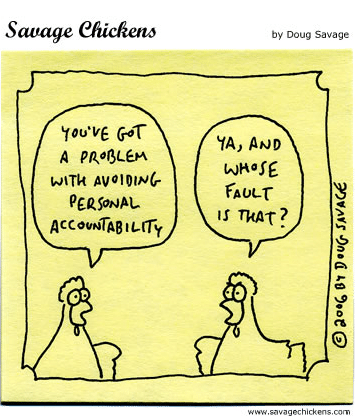
Whether they’re negative or positive, it’s really on their watch, and I think this whole idea really enforces that.
Dan: The reason why a lot of people don’t want to take complete responsibility is because if you do that, you have to give up blaming.
Blaming, for the people who are good at is, is really an enjoyable activity. People will give up almost anything except the ability to blame. When you’re 100 percent responsible, you can never blame anybody or anything for anything that happens to you, and that’s a scary proposition for a lot of people.
Yuri: Yeah. We see it in the health-and-fitness business quite a bit. You see people leaving reviews for books or exercise programs saying: “This doesn’t work.”
Well, the reality is that it probably does work; you just have to work it maybe a little bit more closely to the plan or maybe look a little bit more introspectively and ask yourself, “Did I really do this to the best of my capability?” instead of saying, “This program doesn’t work and, therefore, nobody else will benefit from it.”
Dan: Yes. “This piece of equipment works, but you don’t.”
Look at Your Gains, Not the Gap
Yuri: I want to bring up another one of the concepts you have, that you talk about quite a bit in Strategic Coach, which kind of builds off this whole idea of confidence, which is the whole notion of the Gap.
I guess it ties back into WinStreak as well, where a lot of people in general focus on, like, “I’m one inch away from where I wanted to be, and I’m going to focus on that shortcoming instead of looking at how much I’ve done that’s been great.”
Can you talk a little bit about the Gap and how we can get out of it?
Dan: This is a really life-changing concept, and I’ve seen, literally, hundreds of different examples of how this changes. It’s like a switch in your brain.
If the switch is one way, you see the light in a very negative way that we call the Gap; if it’s switched the other way, you see life in a completely different way, which is positive, which we call the gain.
We’ve actually updated the concept so it’s called the Gap and the Gain.
It’s very interesting. We all have an experience where we’re young, where we have that discovery that there’s this line that separates the sky and the ground when we look off into the distance that we call the horizon.
Probably when you’re six or seven years old, you realize you can’t actually get to that line.
It’s a mechanism in our brain that allows us to come to grips with space. We’re creatures who operate in space, so we have to have a way with orienting ourselves, and this horizon line is very, very useful because we’re not actually trying to get to the horizon; we’re trying to get somewhere between ourselves, which actually does exist, and the horizon. It gives you a sense of perspective and distance.
I haven’t met anyone who’s, later in the life, where they’re just still emotionally disturbed by the fact they can’t get to the horizon. There are lots of problems that show up on daytime television, but not getting to the horizon actually isn’t one of the problems I’ve ever seen – not that I watch daytime television.
There is an almost parallel type of situation that happens in our minds, a mechanism. This one doesn’t relate to space; it relates to time. We can’t go backward in time; we can only go forward in time. We can imagine ourselves backward in time, but we can’t actually go there.
You may think you’re getting to yesterday, but the other seven billion people on the planet don’t, so you don’t get a lot of support for that.
The concept there is called the Ideal. The Ideal operates in exactly the same way the horizon does.
First of all, it’s built into the brain, the ability to see this horizon line.
So is the ability to see an ideal situation.
There is No ‘There,’ so Celebrate ‘Here’
It’s the way that we move ourselves forward in time. We can envision and sometimes we can feel this ideal situation very powerfully; it’s very emotional, very psychological. It motivates us. We move forward because we want to get to the ideal.
But you can’t get to the Ideal. The Ideal simply illuminates the direction you want to go into.
Just as the horizon line allows you to pick an actual spot or location that actually does exist and you can move toward, the ideal illuminates time ahead of us so that we can actually pick a goal that is measurable that you can get to.
You move forward and you get to that point you were trying to get to.
It’s like the breakthrough we were talking about in the Four Cs.
You’re committed to having a breakthrough; you go through the courage and then when you get the capability; you’re actually at the breakthrough.
That’s something you can get to because you can measure it by a number, or you can measure it by an event; it either happened or it didn’t happen.
But when people get to that, they separate into two groups. There are the Gap people and there are the Gain people.
The Gap people, when they get to a point – they achieve something, win an award, have a big payoff – they do something very, very bad with their brain.
This is where the switch I was talking about is located.
They switch their brain so that they measure what they’ve achieved by the ideal, and, just like the horizon line, they haven’t gotten any closer to it. So they achieve and feel like a failure.
They have breakthroughs and feel like a failure. They do amazing things for other people, and they feel like a failure.
The reason is that they’re always measuring against the ideal, whereas the Gain people are always feeling very, very positive about their achievements because when they actually get to the achievement, the actual goal, instead of measuring against the ideal, they turn around and measure where they started from.
In the physical space, if you go someplace and then measure against the horizon, you feel like you’ve made no progress.
The way you feel progress is by turning around and seeing where you came from. Then you feel like you’ve made a tremendous amount of progress.
Favor the Gains You Make
I’ve seen people not commit suicide because of this concept. I’ve had people who were deeply addicted and came out of their addiction because they realized their addiction was this attempt to get to this ideal feeling and experience.
One example is of a severely malnourished young lady who had an eating disorder; this is one of the children of one of our clients. She would look in the mirror, she was 5-foot-10 and weighed 97 pounds. She looked in the mirror, and all she saw was a fat person. She had this ideal of herself that was actually thinner than she actually was.
Her father gave her the audio recording from our program and had her listen to it, and he talked her through it. She snapped out of it in two weeks. She had been to clinics, to specialists, and to experts.
I find almost all the misery that people have in their lives – I’m not talking about pain; you can have pain, which is inflicted from the inside – the disappointment, the depression, disillusion, comes from the fact that when you actually have an achievement, you measure against the ideal instead of measuring backward against the starting point, so you’re always favoring the Gap and never favoring the Gain.
Yuri: How does somebody train themselves to become more of a gainer as opposed to a gapper?
Dan: Back to the Four Cs. You have to commit yourself.
We’re pulling everything together here, Yuri, you clever interviewer, you.
We’re pulling everything together because it means at the end of each day, you count your wins. You can only count your wins by measuring backward; otherwise, they look like another frustration, another loss. That takes a commitment.
It would take a commitment of two or three weeks to every night and making sure that the best ways to get the app WinStreak – it’s on the Apple Store.
Every night, make sure you log in your three wins. There’s also room on that app to actually sketch out what your wins are going to be for tomorrow.
You’re not only making the day you just lived really positive, but you’re setting yourself up for a positive day tomorrow. Do that for two or three weeks and, all of a sudden, you snap out of that Gap thinking and you start going into the Gain thinking.
It’s a habit. Ultimately, people are either successful or unsuccessful based on their habits, what they’ve trained themselves to do automatically and all the time is really the key to everybody’s success.
Yuri: This has been tremendous, Dan.
I would encourage to take some time to really allow these concepts to sink in and take hold in your being. There really powerful once you start to really live them.
Very simply, go to the App Store and get WinStreak. I’ve used it for at least two years now and it’s super simple; it takes less time than brushing your teeth.
It’s a great habit to reinforce that positive mind-set to move you in the right direction.
Dan: That’s exactly right.
Yuri: Dan, I want to thank you so much for taking the time for this interview; I know you’re a busy man. Do you have any final words of wisdom for our listeners?
Dan: I just want to remind them that they should do WinStreak and brush their teeth. I’m not substituting one habit here for another.
Yuri: Great advice. It’s always nice to have good dental hygiene…
For all you guys and gals listening, take action on at least one thing you’ve learned today. Grab the app and most importantly, go out today and make somebody’s life even more valuable.
What Next?
Learn Dan’s masterful ways and grab a free copy of his “The Four C’s” book here.

